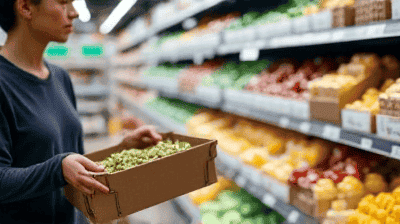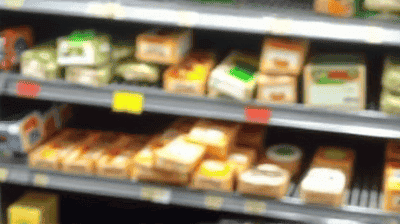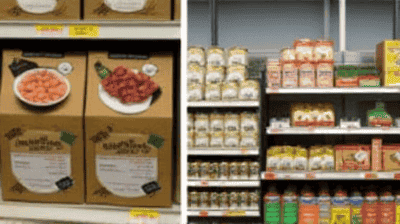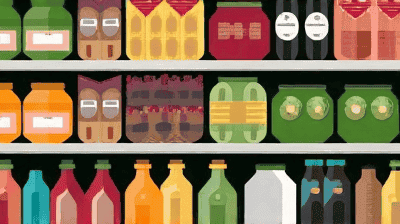
Food waste is one of the most pressing environmental issues of our time, with approximately one-third of all food produced globally going uneaten. This waste not only signifies a massive economic loss but also has profound implications for climate change, resource depletion, and food security. As countries grapple with this crisis, France has emerged as a global leader in tackling supermarket food waste through innovative legislation and community engagement.
Food waste encompasses the discarding of edible food products at various stages of the supply chain, including production, processing, distribution, and consumption. In supermarkets, substantial amounts of food are wasted due to aesthetic standards, overstocking, and expiration dates. This waste not only reflects inefficiency in the food system but also poses ethical and environmental challenges.
According to the Food and Agriculture Organization (FAO), approximately 1.3 billion tons of food are wasted each year. This equates to about $ 940 billion in economic losses and contributes to approximately 8-10% of global greenhouse gas emissions. France's approach to reducing food waste takes root in the recognition of these alarming statistics and the desire for substantial change.
When food is discarded, it represents a loss of not only the food itself but also the resources that went into producing it—such as water, energy, and labor. Additionally, food waste contributes to methane emissions when it decomposes in landfills, further aggravating climate change. Understanding these impacts has driven the French government and civil society to take action against food waste, particularly within the grocery sector.

In 2016, France passed landmark legislation to combat food waste at the supermarket level, becoming the first country in the world to impose a law specifically targeting waste generated by grocery stores. This law was a result of growing public concern over food waste and an increasing recognition of food as a valuable resource.
Ban on Food Disposal: Grocery stores with a surface area of over 400 square meters are prohibited from throwing away unsold food. Instead, they must donate it to charities, food banks, or other organizations involved in food redistribution.
Donation Obligations: Supermarkets are required to establish partnerships with non-profits and donate perishable and non-perishable items that are still fit for consumption.
Promotion of Composting: The law also encourages supermarkets and consumers to practice composting leftover food, supporting methods that transform waste into valuable resources for agriculture.
Awareness Campaigns: The legislation mandates campaigns aimed at raising public awareness of food waste and its environmental impacts.
The success of the law is underpinned by broad public support and advocacy. Various non-governmental organizations and citizen-led initiatives played a key role in raising awareness about food waste and pushing for legislative change. Campaigns focused on the ethical implications of food waste—linking it to hunger and sustainability—helped build momentum for the law's passage.
The 2016 law created a framework for grocery stores to collaborate with non-profit organizations that focus on food redistribution. This partnership system has been crucial in ensuring that donated food reaches those in need. Organizations like the Restos du Coeur and the Food Bank network have played a vital role in facilitating food donations.
However, establishing these partnerships required careful logistical planning. Supermarkets had to develop systems for tracking food that was nearing its expiration date while ensuring safe storage during transportation. Non-profits also faced challenges in scaling up their operations to accommodate the increased volume of food donations.
Intermarché: One of the major supermarket chains in France, Intermarché, embraced the food waste ban by launching the "Inglorious Fruits and Vegetables" campaign, which promotes the sale of imperfect produce at reduced prices. This initiative not only reduces waste but also highlights the value of all food, regardless of appearance.
Leclerc: Another prominent chain, E. Leclerc, created a program to donate unsold food to local food banks, ensuring that food reaches vulnerable populations in the community. Their proactive approach has set a standard for other supermarkets to follow.
The effectiveness of the food waste ban has been monitored through various studies and reports. According to the French Ministry of Agriculture, food waste in supermarkets has dropped significantly since the implementation of the legislation. The reduction of food waste not only benefits the environment but also results in economic savings for consumers and retailers alike.

France's efforts to combat food waste have contributed to a broader cultural shift towards sustainability. Increasing consumer awareness of food waste issues has led to changes in purchasing behavior, with more shoppers opting for imperfect produce and supporting initiatives that emphasize food redistribution.
Education has been a central component in promoting sustainable practices among consumers. Schools, universities, and community organizations have begun incorporating food waste education into their curricula, fostering a sense of responsibility and commitment to sustainable food practices in younger generations.
In addition to government-led efforts, community-driven initiatives have emerged to bolster the fight against food waste. Local markets, community kitchens, and food-sharing programs have proliferated, reinforcing the importance of reducing waste at the grassroots level.
Despite the progress made, challenges remain. Some supermarkets have reported initial resistance to the mandated changes, expressing concerns over logistics and profit margins. Ongoing dialogue between retailers, policymakers, and non-profits is essential to address these concerns and to foster a cooperative mindset.
While the 2016 law has made considerable strides in reducing supermarket food waste, there is an opportunity for further advancement. Policymakers are now considering expanding the legislation to include smaller businesses and restaurants, addressing food waste generated throughout the entire food supply chain.
Technological advances present exciting possibilities for future waste reduction initiatives. Enhanced inventory management software, apps for food sharing, and tracking systems can improve the efficiency of food redistribution efforts. Investing in technology can empower both businesses and consumers to take proactive measures in minimizing waste.
France's leadership in combating food waste has inspired other countries to consider similar legislation. The EU has taken note of France's success and initiated discussions on implementing food waste reduction strategies across member states. France's example serves as a model for global efforts to reduce food waste.

Addressing food waste requires a holistic approach that includes not only legislation but also collaboration among stakeholders throughout the food system. Sustainable practices must be integrated at every stage, from production and distribution to consumption and disposal.
Consumers play a vital role as stakeholders in the food waste conversation. Encouraging mindful consumption, meal planning, and the responsible use of leftovers can result in significant reductions in household food waste.
Ongoing policy support and funding for food waste reduction programs are essential to maintain momentum. Governments must prioritize initiatives that promote sustainability and incentivize businesses to invest in waste reduction measures.
France's journey toward becoming a global leader in supermarket food waste bans exemplifies the power of legislative action, community engagement, and cultural change in addressing a critical challenge. The combination of a robust legal framework, public awareness, and partnerships with non-profits has successfully reduced food waste and fostered a culture of sustainability.
As the world grapples with the dual challenges of hunger and environmental degradation, France's experience serves as a beacon of hope and a model for other nations seeking to implement similar solutions. By continuing to build on these successes, France can further solidify its position as a leader in sustainable food systems.
Promoting a culture of generosity, responsibility, and awareness surrounding food waste is crucial for ensuring that food is valued and utilized to its fullest potential. Together, we can work towards a future where food waste is minimized, resources are preserved, and everyone has access to nutritious food.